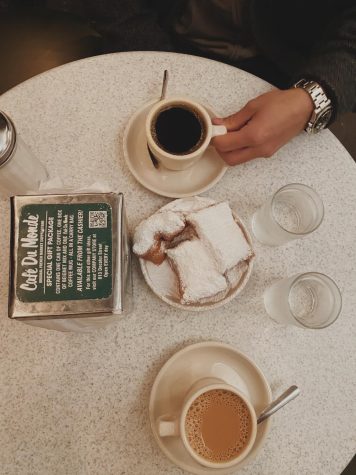IT’S BEIGNET A WHILE
mardi gras recipes for the whole family
The first Mardi Gras celebration is dated back to 1699 when the French explorers celebrated their exploration of America. They celebrated by eating fatty foods which is where the name ‘Mardi Gras’ originates from. Mardi gras is French for ‘Fat Tuesday’

King cake: King cake is a classic Mardi Gras tradition. The tradition is that a little plastic baby is put somewhere in the cake, and whoever gets the slice with the baby in it is in charge of making the cake for next year. King cake comes in various flavors, but the New Orleans tradition is cinnamon flavored dough covered with icing. It is sometimes filled with a cream cheese filling. French and Spanish settlers brought the tradition to America. It is believed that the individual who finds the figurine within the cake, is meant to have good fortune.
Dirty Rice: Dirty rice gets its unique name because of its brownish color, which comes from the meat and spices it’s cooked with. Dirty rice can be traced back to the plantation days of Louisiana. People who had large gatherings to feed would make the traditional dish. They would cook plain white rice, which was abundant during that time, and cook it with the available meats, spices, and vegetables.
Gumbo: Gumbo has always been important to Southern Louisiana because of its representation of the different cultures within Louisiana. It combines the culinary traditions and practices of Africans, Native Americans, Spanish, and French. The name ‘gumbo’ came from the West African word “ki ngombo” which translates to “okra”; it is called this because they used okra as a thickening agent.
Beignets: Beignets originated from French influence in Louisiana. They trace their ancestry to Celtic and French. The word “beignet” means “to raise” in Celtic and means “fritter” in French. They were introduced in the 18th century by French Acadians, and beignets were later named the official state doughnut of Louisiana in 1986. Beignets are traditionally served warm with powdered sugar and typically eaten for breakfast or as dessert.





